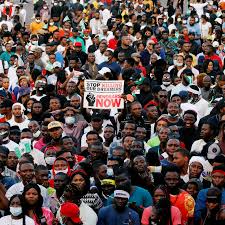
WILL TINUBU SURVIVE THE LOOMING ANARCHY?, BY ERASMUS IKHIDE
Disillusioned Nigerian masses feeling the pang of economic crunch occasioned by President Bola Amhed Tinubu’s wrongheaded economic blueprints and fuel subsidy removal are already throwing spit into the air and collecting it with their face over the looming hunger protest slated for August 1st to 10th next week.
Here are the conundrum: will President Tinubu survive the protest from the benefit of hindsight, having been forewarned of the impending doom? Can he starve off the nation’s wrath for his bad vices through strategic politicking and empathy? We shall come back to that later.
Before Tinubu’s Presidency, Nigeria’s economic woes has remained a complex and multifaceted one, buoyed by yester-years of primitive economic policies which included but not limited to over-reliance on oil exports.
Nigeria’s economy is heavily dependent on oil exports, which makes it vulnerable to fluctuations in global oil prices.
Second is corruption. Widespread corruption has hindered economic growth, discouraged investment, and led to a lack of trust in institutions.
Third is poor infrastructure. Inadequate infrastructure, such as roads, power supply, and transportation, hinders economic activity and increases costs.
Fourth is Insecurity. Security challenges, including Boko Haram and banditry, have disrupted economic activity, discouraged investment, and led to humanitarian crises.
Fift is political instability. Political uncertainty and instability have created an unfavorable business environment.
Sixth is lack of economic diversification. Nigeria’s economy remains largely undiversified, making it vulnerable to external shocks.
Seventh is high inflation: Persistent high inflation has eroded purchasing power and reduced the standard of living.
Eight is unemployment. High unemployment rates, especially among youth, have contributed to social unrest and economic stagnation.
Nineth is dependence on imports. Nigeria’s reliance on imported goods has led to a significant trade deficit and depleted foreign exchange reserves.
Tenth is climate change. Climate-related shocks, such as droughts and floods, have impacted agricultural productivity and food security.
The eleventh reason Nigeria economy is going through turbulence is weak institutions. Ineffective institutions, including the judiciary and regulatory bodies, have hindered economic growth and development.
The twelveth reason is demographic challenges. Rapid population growth and urbanization have put pressure on the decaying infrastructure, services, and resources.
Back to the issue of stagnation and economy degradation which President Tinubu inherited and further sunk abysmally without redemption.
First, I do not want to believe that President Tinubu can’t address these interconnected challenges with a comprehensive and sustained effort by his policymakers, business leaders, and civil society to promote economic growth, reduce poverty, and improve living standards in Nigeria.
As Senator Ali Ndume puts it, his handlers are foggy his vision not see through the facades of falsehoods he is being field with.
Asides the fundamental foundation crises plaguing this nation, President Tinubu’s antideluvia strategists fanning the flames ethic violence – blaming everyone else other than themselves – are some of the thousand and one reasons the nationwide hunger protest most hold, albeit peacefully.
Whether his administration survives it or not is another matter, altogether. From all available indices, it is less likely that Tinubu’s government would survive the coming anarchy.
That Tinubu is unfeeling; asphyxiating, unemphatic and his outright boorishness, with his on-your-face impudent is a straightforward indication his government has crossed the rubicon.
Tinubu’s life time ambition is to govern Nigeria at all costs and by all means, and he got it. He should pursue the course of his governance to a logical conclusion. After all, Friedrich Nietzsche, the German philosopher’s eternal counsel urge all to “perish in the pursuit of your goal as there’s know no higher life-purpose than to perish in pursuit of something great and impossible”.Erasmus Ikhide contributed this piece via: ikhideluckyerasmus@gmail.com
 Premium News
Premium News